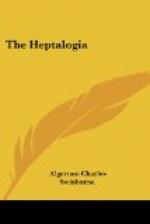with my dignity,
That the author of Christabel ever should smart from such vulgar malignity. (You remember perhaps that was one of the first little things that I
carolled
After finishing Marmion, the Princess, the Song of the Shirt, and
Childe Harold.)
Oh, doubtless it always has been so—Ah, doubtless it always will be— There are men who would say that myself is a different person from me. Better the porridge of patience a poor man snuffs in his plate Than the water of poisonous laurels distilled by the fingers of hate.
’Tis a dark-purple sort of a moonlighted
kind of a midnight, I know;
You remember those verses I wrote on Irene, from Edgar
A. Poe? It was Lady Aholibah Levison, daughter
of old Lord St. Giles, Who inspired those delectable
strains, and rewarded her bard with her
smiles.
There are tasters who’ve sipped of Castalia,
who don’t look on my
brew as the brew:
There are fools who can’t think why the names
of my heroines of title
should always be Hebrew.
‘Twas my comrade, Sir Alister Knox, said, “Noo,
dinna ye fash wi’
Apollo, mon;
Gang to Jewry for wives and for concubines, lad—look
at David and
Solomon.
And it gives an erotico-scriptural twang,” said
that high-born young
man, “—tickles
The lug” (he meant ear) “of the reader—to
throw in a touch of the
Canticles.”
So I versified half of The Preacher—it
took me a week, working slowly.
Bah!
You don’t half know the sex, Bill—they
like it. And what if her name
was Aholibah?
I recited her charms, in conjunction with those of
a girl at the cafe, In a poem I published in
collaboration with Templeton (Taffy). There are
prudes in a world full of envy—and some
of them thought it
too strong
To compare an earl’s daughter by name with a
girl at a French restaurant. I regarded
her, though, with the chivalrous eyes of a knight-errant
on
quest;
I may say I don’t know that I ever felt prouder,
old friend, of a conquest. And when I’ve
been made happy, I never have cared a brass farthing
who
knew it; I
Thank my stars I’m as free from mock-modesty,
friend, as from vulgar
fatuity.
I can’t say if my spirit retains—for
the subject appears to me misty—any
tie
To such associations as Poesy weaves round the records
of Christianity. There are bards—I
may be one myself—who delight in their skill
to unlock
a lip’s
Rosy secrets by kisses and whispers of texts from
the charming Apocalypse. It was thus that I won,
by such biblical pills of poetical manna, From two
elders—Sir Seth and Lord Isaac—the
liking of Lady Susanna. But I left her—a
woman to me is no more than a match, sir, at tennis
is— When I heard she’d gone off with
my valet, and burnt my rhymed version
of Genesis.
You may see by my shortness of speech that my time’s




